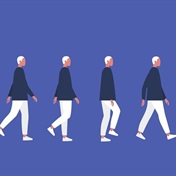The milkshake drug, called Ketasyn, provides a dramatically different approach to dementia. It hinges on recent research that suggested diabetic-like changes in brain cells' ability to use sugar for energy play a role in at least some forms of Alzheimer's.
Special fatty acids in Ketasyn offer an alternate food source to rev up those hungry neurons, researchers told an international Alzheimer's meeting in Washington on Monday.
In a study of 150 patients, adding Ketasyn to their regular medicines produced a small but important boost in mental functioning - but only in people who do not carry an Alzheimer's gene called ApoE4. Still, that is about half of all patients.
Co-therapy
"We see this as a co-therapy," not a way to stop Alzheimer's,
cautioned Dr Lauren Constantini, a former Harvard University
scientist now with the company Accera Inc., which is developing the
drug.
Indeed, to stop Alzheimer's brain decay, most scientists have their hopes pinned on drugs that promise to prevent a sticky goo called beta-amyloid from clogging patients' brains.
Monday brought frustrating news on that front: The first of those amyloid blockers to make it to large-scale, Phase III testing has hit a hurdle, and scientists will have to wait until at least month's end to learn if the much-anticipated drug Alzhemed works.
Comparisons
The problem is statistical, said lead researcher Dr Paul Aisen
of Georgetown University: Hospital-to-hospital differences in other
medication use among the study's 1 000 participants prevent an
immediate clear comparison of Alzhemer's role.
Working with the Food and Drug Administration, researchers are adjusting for those variations, Aisen told the US Alzheimer's Association's dementia prevention meeting.
Stay tuned, he said. There are hints that Alzhemed-treated patients fared better.
Other new drugs:
- Eli Lilly & Co. hopes to halt beta-amyloid formation by
blocking an enzyme called gamma secretase involved in its creation.
Among 51 patients given the still-unnamed drug, those who took the highest dose had a 65 percent reduction of beta-amyloid in their blood. The study did not last long enough to tell whether their symptoms improved, too, but the drop was so big that Lilly will begin a Phase III trial early next year to try prove the approach.
"This is a robust effect," said Lilly researcher Dr Eric Siemers. "How could you not do a Phase III study?" -Also next year, scientists will begin a US study of an old Russian antihistamine against Alzheimer's.
Russian study
A study of 180 Russian patients found the drug Dimebon improved mental functioning, patients' ability to care for themselves and some other measures, said Dr Rachelle Doody of the Baylor College of Medicine.After a year of treatment, patients' mental functioning had gotten no worse than when they started. Scientists think Dimebon may have some capacity to save neurons from death, said Dr David Hung, chief executive of the manufacturer, Medication Inc.
- The milkshake drug Ketasyn follows the principle that when
someone fasts, the body lives off stored fat. Ketasyn contains
fatty acids that the liver metabolizes into substances called
ketones, similar to what is produced during a fast. Brain cells can
use ketones in place of sugar for energy.
That also is similar to the high-fat, low-protein ketogenic diet sometimes used for children with severe epilepsy. Manufacturer Accera currently is hunting money for a Phase III study and exploring different formulations for epilepsy and other brain disorders.
- Finally, Elan Corp. plans a Phase III trial this year that will infuse patients with immune-system cells called antibodies to attack the plaque that clogs their brains. Elan earlier tried using a vaccine to spark patients' bodies to make their own antibodies research halted when a handful of participants suffered serious brain inflammation. But Monday, Elan presented evidence backing the general approach: 4½ years after the ill-fated vaccine study, 17 patients still harbour those antibodies, and their Alzheimer's has worsened much slower than that of their unvaccinated counterparts. – (HealthDayNews)
Read more:
Alzheimer’s Centre
June 2007




 Publications
Publications
 Partners
Partners














